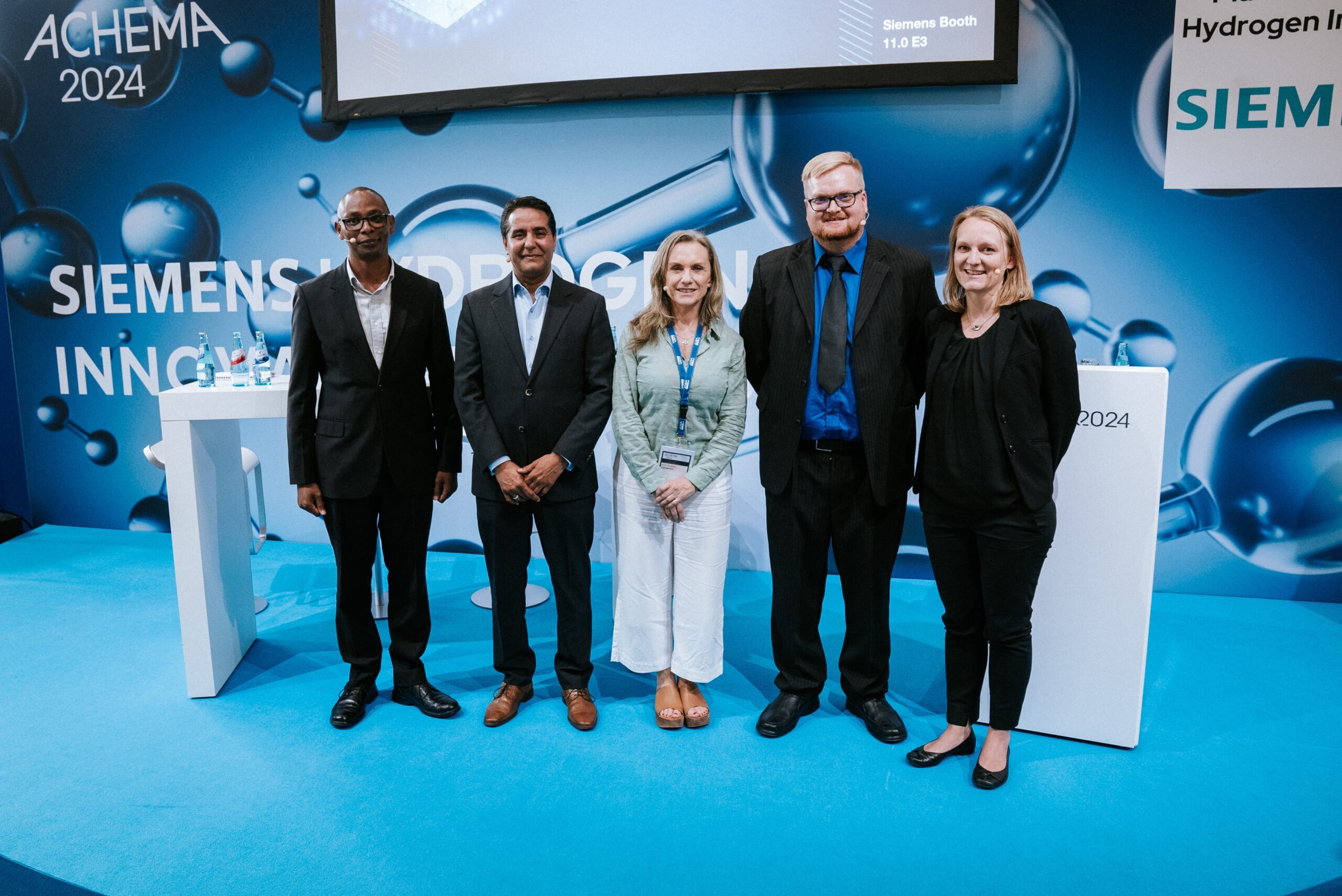The ACHEMA 2024 conference, held in Frankfurt am Main, Germany, provided a platform for professionals in the chemical and process industries to engage with innovations and foster international collaboration. The International PtX Hub, in partnership with DECHEMA, hosted two insightful panel sessions focusing on the potential and challenges of Power-to-X (PtX) technologies, green hydrogen and transforming visions into reality.
These sessions underscored the importance of international cooperation, regulatory support, and continuous innovation in advancing PtX solutions and reaching defossilisation goals.
Morning Session: “Chances and challenges of Power-to-X in Argentina, Morocco, and South Africa”
The morning session, organised by DECHEMA, provided a comprehensive exploration of green hydrogen and PtX strategies and use cases in Argentina, Morocco, and South Africa. This session brought together experts from academia and industry to discuss pathways for implementing PtX technologies.
Global synergy for green hydrogen: Heino von Meyer on PtX Hub and international collaboration
Heino von Meyer, Head of global relations and networking at the International PtX Hub, opened the session by highlighting the mission of the PtX Hub: to catalyse green hydrogen solutions globally, focusing on sustainability along the entire value chain. Drawing on his extensive experience, Heino accentuated the importance of international cooperation to achieve these ambitious goals.
Green Hydrogen and ammonia: academic insights driving industrial applications
Abdessamad Faik from UM6P – Professor at Mohammed VI Polytechnic University and LIMSET Laboratory of Inorganic Materials for Sustainable Energy Technologies Director, presented academic perspectives that are shaping industrial applications of green hydrogen and ammonia. He underscored the compulsory role of research and development in advancing these technologies, driving both innovation and practical implementation.
The LIMSET, located in Morocco, advances Sustainable Energy Technologies globally. Comprising esteemed professors, Ph.D. students, and researchers, it pioneers material synthesis for improved efficiency and eco-friendliness. LIMSET’s research covers advanced materials and innovative systems for energy production and storage.
PetroSA’s pathway to carbon neutral fuels and chemicals
Dr Evans Itai Mabaso of PetroSA discussed the company’s strategic approach to transitioning towards carbon-neutral fuels and chemicals. He highlighted PetroSA’s unique position, given its existing gas-to-liquids infrastructure and coastal location, which facilitate the export of sustainable fuels to global markets. Dr Mabaso outlined the depletion of gas wells as an opportunity to shift towards sustainable fuel production, leveraging existing infrastructure for cost-effective PtX production.
He argued that PetroSA is well-positioned for PtX due to its unique setup as a smaller, state-owned synthetic fuels producer on the coast in Mossel Bay, South Africa. The company’s coastal location and size make it ideal for repurposing to produce sustainable fuels and chemicals, particularly for the aviation and marine fuel markets in Europe and the Far East. PetroSA’s existing infrastructure offers a cost-effective advantage over building new refineries, potentially making its sustainable products competitive in export markets.
Challenges and opportunities in H2/PtX production in Argentina:
Liliana Mogni from CONICET National Council Science & Technology, shared insights on Argentina’s advancements in materials science, catalysis, and engineering for new PtX technologies. She outlined Argentina’s abundant natural resources and ambitious goals for green hydrogen production, aiming for significant exports by 2050. Liliana stressed the need for infrastructure investments, value chain development, and skilled labour to realise these goals.
She discussed PtX in Argentina, underlining the country’s natural resources and opportunities. As South America’s second-largest country, Argentina has published its National Strategy for Hydrogen (ENH2), aiming by 2050 to produce 5Mt of green hydrogen per year (80% for export), install 30 GW of electrolysers and 55 GW of renewable energy capacity, and attract 90 billion USD in investment. Infrastructure investments, such as road corridors and ports, are compulsory for large-scale renewable energy projects.
Moreover, certification and regulatory frameworks play a central role in reducing emissions and achieving green premiums. Argentina’s education, science, and technology system, bolstered by tuition-free university access and institutions like CONICET with over 11,800 researchers, including 40% women and 43% specialising in “hard sciences”.
-
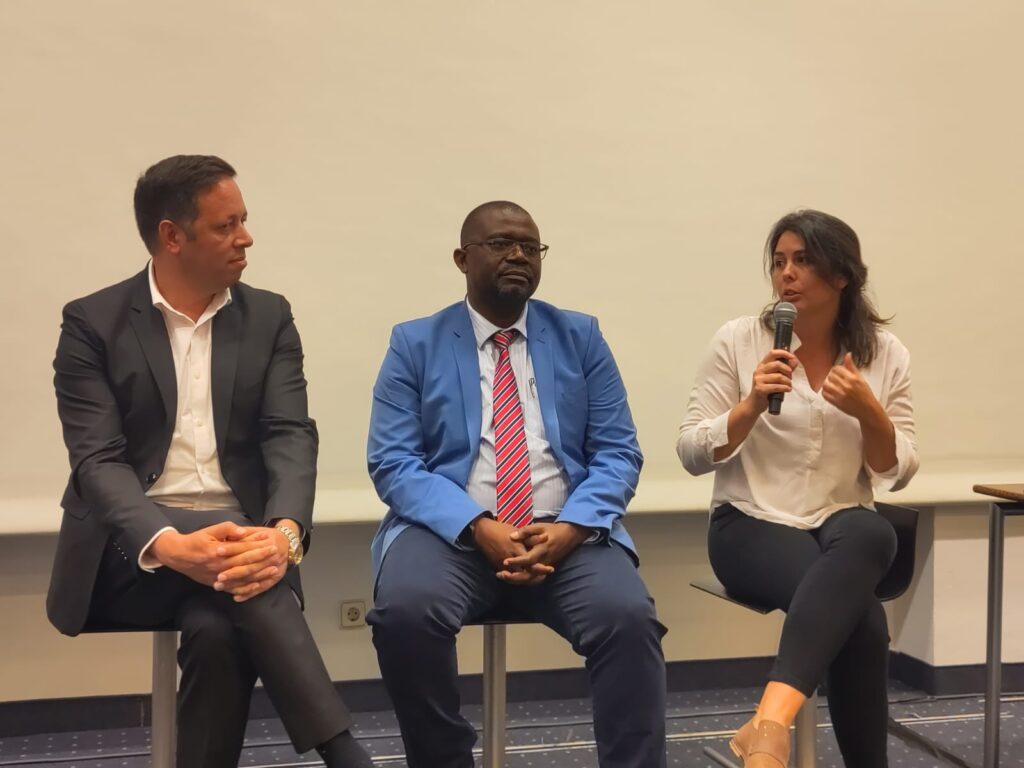
Panelists at Dechema session. -
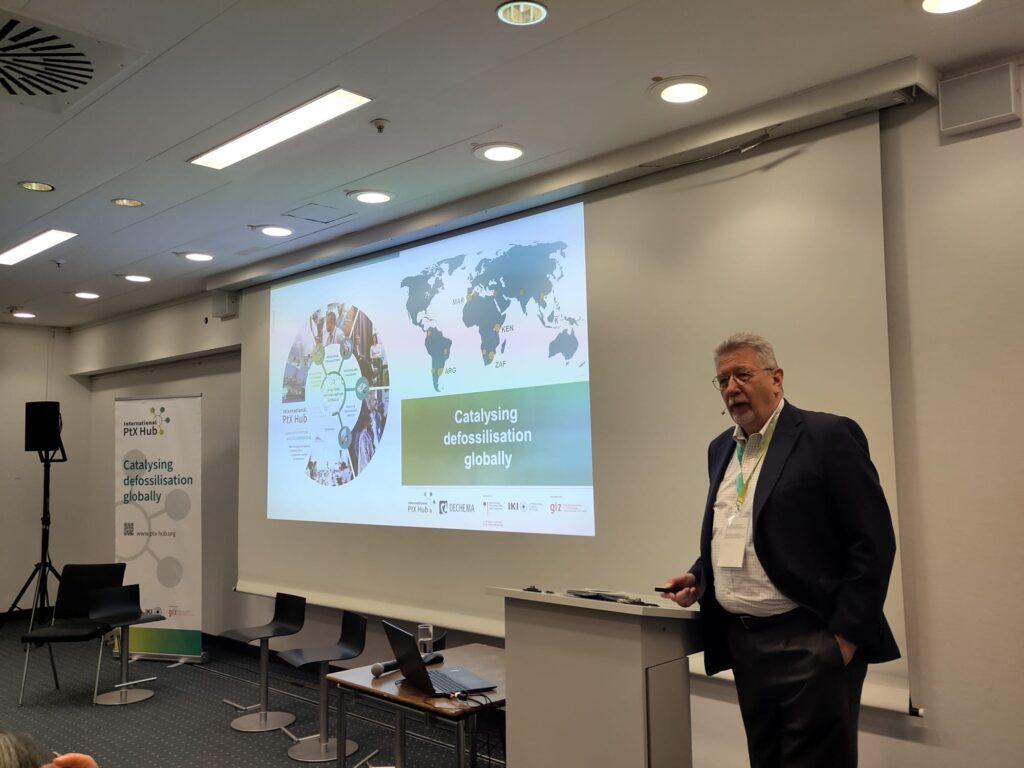
Heino von Meyer, PtX Hub moderating the session.
Afternoon Session: “Transforming Visions of Green Hydrogen and Power-to-X into Reality”
The afternoon session focused on translating the vision of green hydrogen and PtX into practical applications, featuring case studies from Argentina, Kenya, Morocco, and South Africa. Moderated by Ruth Barbosa, Advisor at the International PtX Hub, the session showcased diverse approaches to achieving defossilisation goals through international cooperation.
-
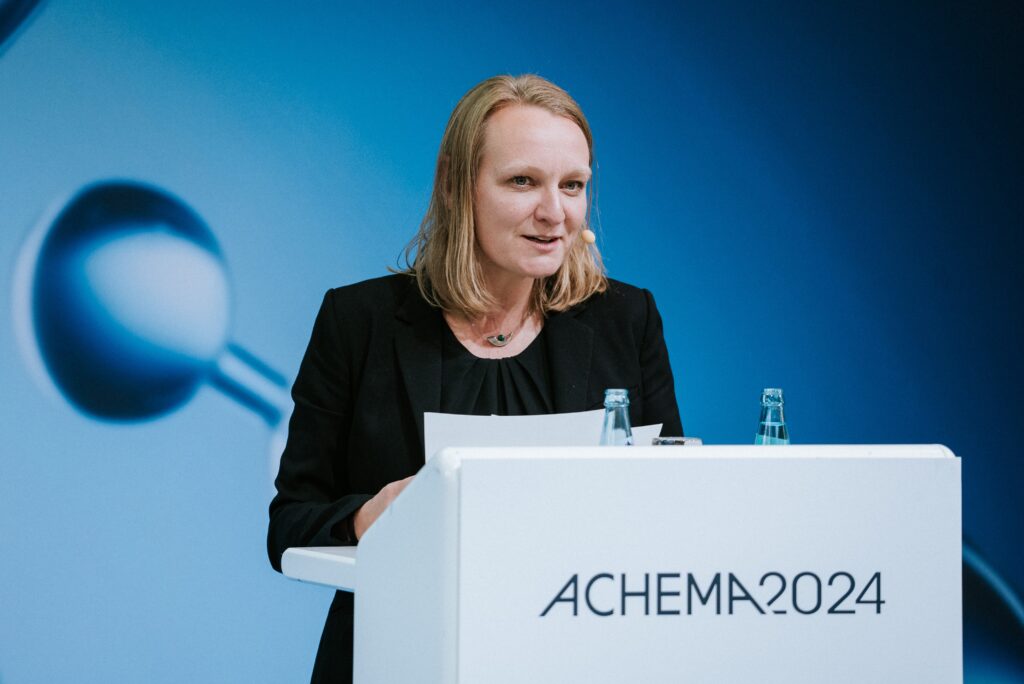
Ruth Barbosa, Advisor at International PtX Hub, moderating at the Siemens Hydrogen Stage -
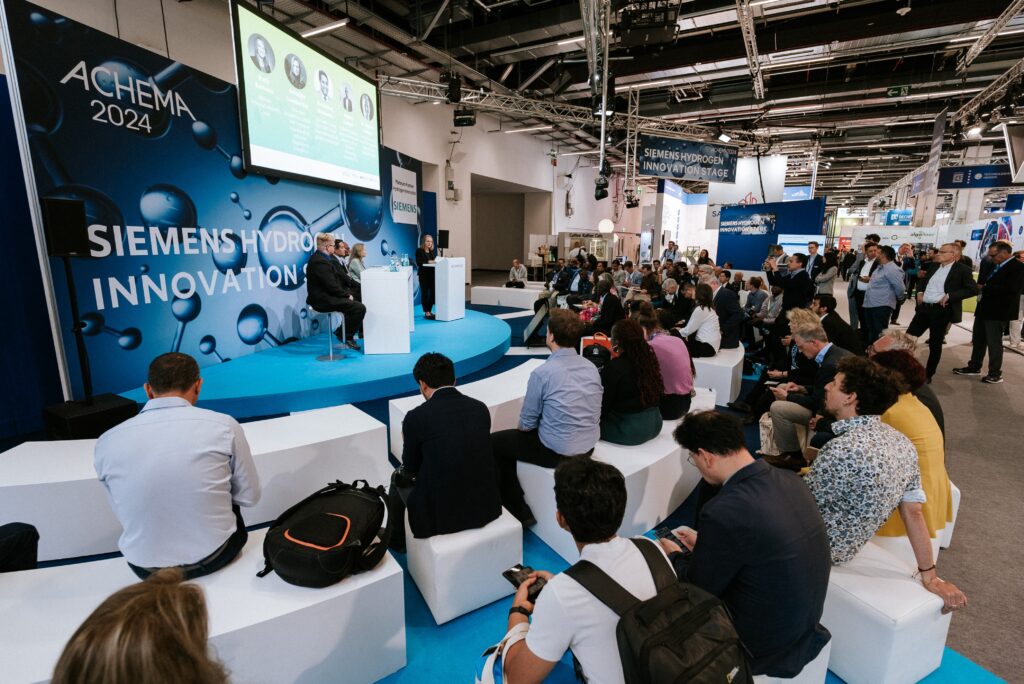
Siemens Hydrogen Innovation Stage
Highlights of the Panel Discussion:
Strategising for a sustainable future: Insights from Mohamed Bousseta on Morocco’s green hydrogen and ammonia investments
Mohamed BOUSSETA, CEO of Green Energy Park at UM6P, highlighted Morocco’s significant investments in green hydrogen and ammonia production. Bousseta discussed the critical need for skilled labour and addressing transport logistics to achieve Morocco’s carbon neutrality strategy by 2040, led by the OCP Group. he argued the importance of education and research to support these initiatives. Moreover, he delved into the implementation of “Offre Maroc”: the Moroccan Offer for the development of green hydrogen sectors. This strategy for ramping up the H2 sector in Morocco is aimed at investors consortia planning to develop projects to produce green hydrogen and PtX products for the Moroccan market and for exports. The main key aspect is the allocation of land resources: up to 1 million hectares.
Advancing green steel: Dr. Rigardt Coetzee on financial hurdles and sustainable innovations in export corridors
Dr Rigardt Coetzee from the Council for Scientific and Industrial Research (CSIR) focused on green steel production and the development of green corridors for export. He presented the financial challenges and the potential for sustainable aviation fuels and carbon market integration, highlighting the need for public and private sector investment.
-
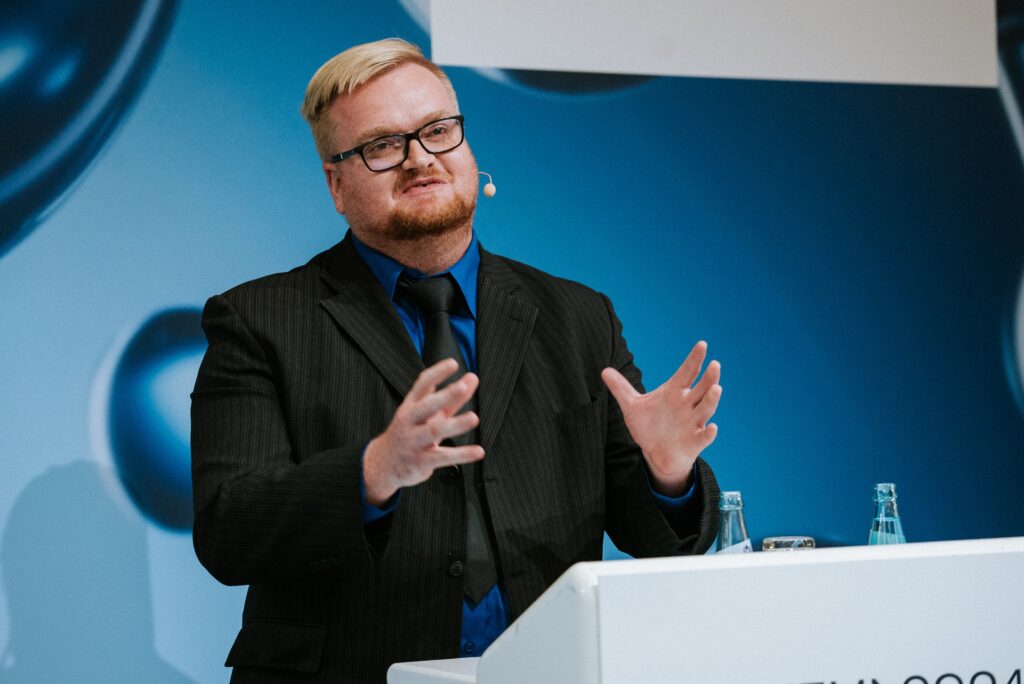
Dr. Rigardt Coetzee, Senior Researcher at the Council for Scientific and Industrial Research (CSIR) -
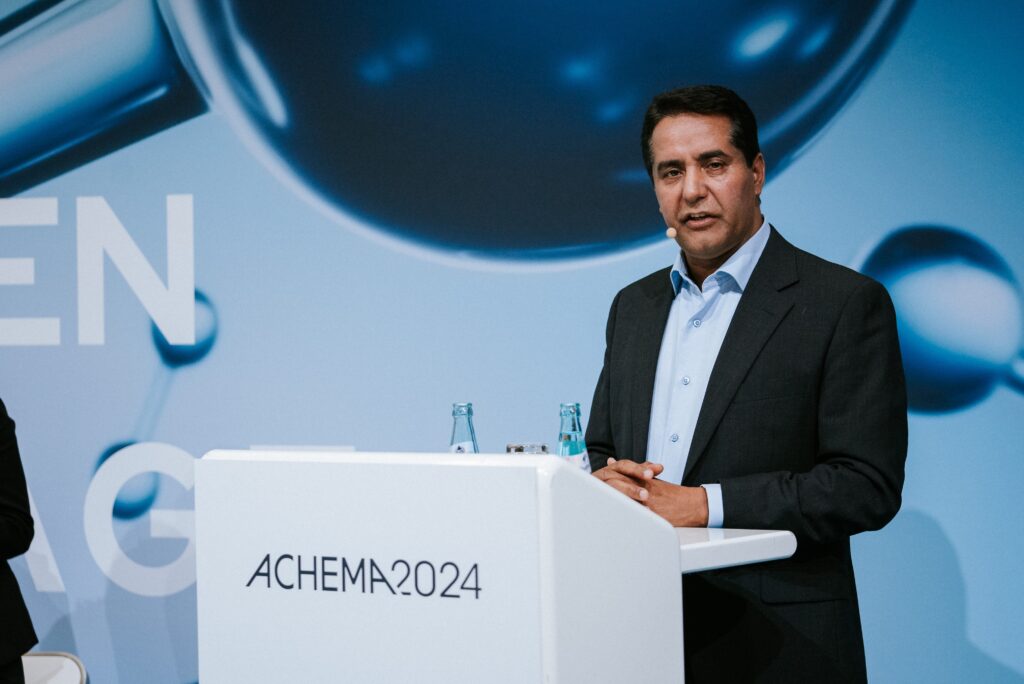
Mohamed Bousseta, CEO of Green Energy Park at UM6P – Mohammed VI Polytechnic University
Shaping Argentina’s hydrogen future: Griselda Lambertini on strategy, integration, and investment
Griselda Lambertini from CEARE – UBA outlined Argentina’s National Hydrogen Strategy, highlighting the integration of green hydrogen into local and export markets. She discussed leveraging the country’s natural gas network and addressing technological and market challenges to boost the hydrogen economy. Griselda emphasised the need for regulatory support and certification to attract investors and ensure market development.
Kenya’s renewable vision: Langat Antony on geothermal, hydro, and green hydrogen integration
Langat Antony from the Kenya Electricity Generating Company PLC detailed Kenya’s renewable energy strategy, focusing on geothermal, hydro, and hydrogen. He discussed integrating green hydrogen into agriculture, enhancing regulatory frameworks to attract investments, and the country’s aim to leverage its renewable energy resources for economic growth.
-
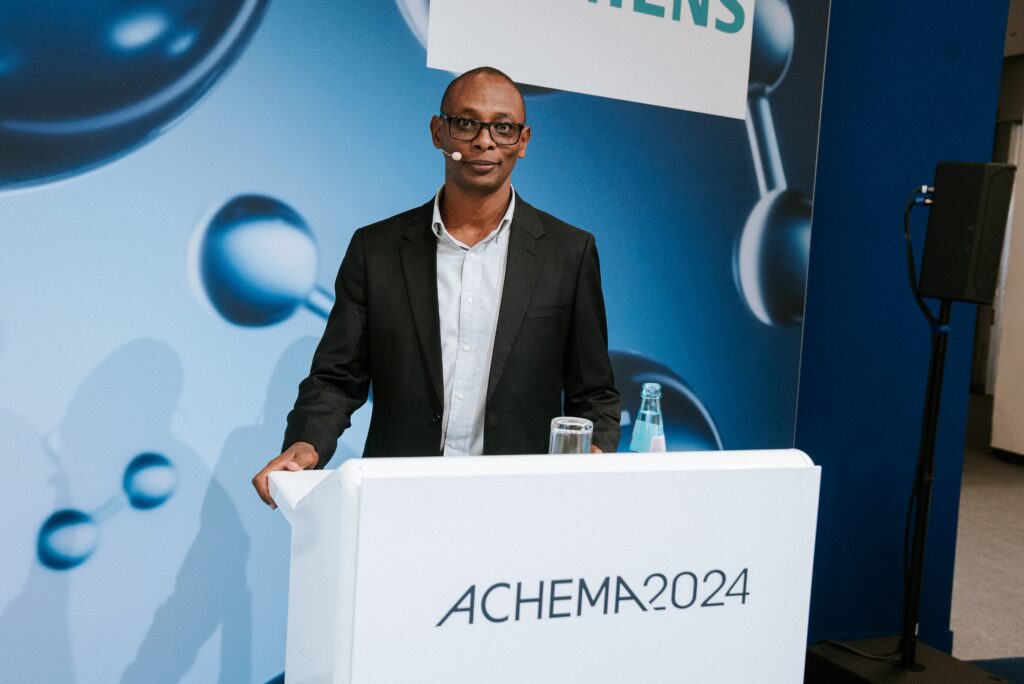
Antony Langat, Assistant Manager at Kenya Electricity Generating Company PLC -
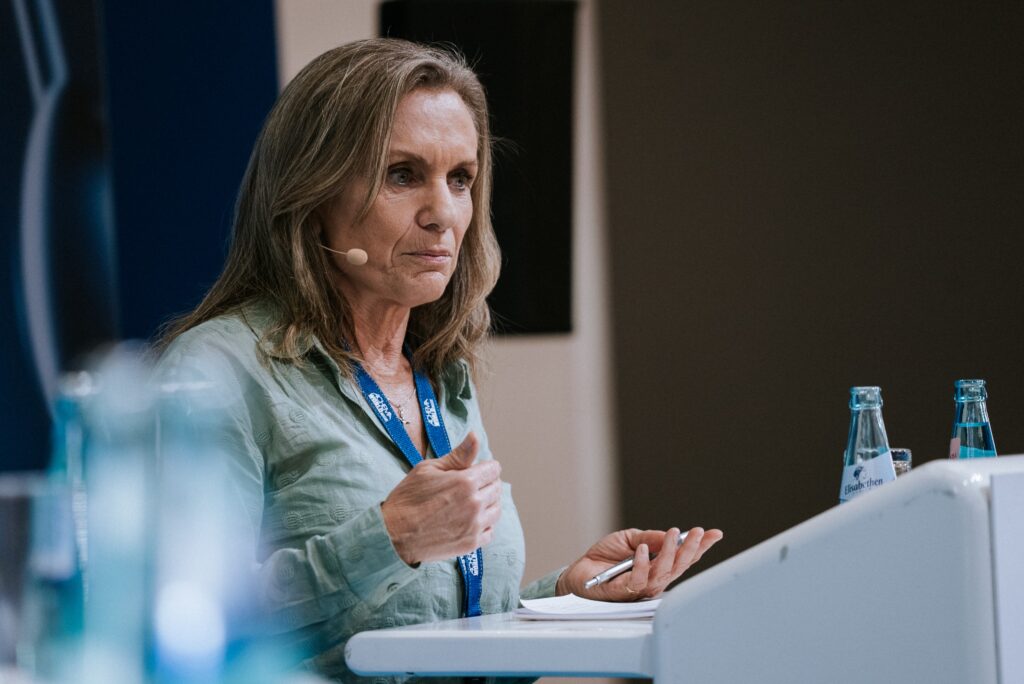
Griselda Lambertini, Directora Académica at CEARE – UBA Centro de Estudios de la Actividad Regulatoria Energética
Key Takeaways:
- Regulatory support: Each country underscored the importance of robust regulatory frameworks to attract investments and ensure the safe and efficient development of PtX technologies.
- Technological advancements: Continuous innovation in PtX technologies is crucial for overcoming existing challenges and achieving defossilisation goals.
- Financial investments: Significant financial investments are necessary to develop the infrastructure and technologies needed for large-scale PtX production.
- Skill development: Developing skilled labour through education and training is vital to support the growth of the PtX industry.
- International cooperation: Collaborative efforts between countries and regions are essential to harness the full potential of PtX technologies and achieve global sustainability goals.
-
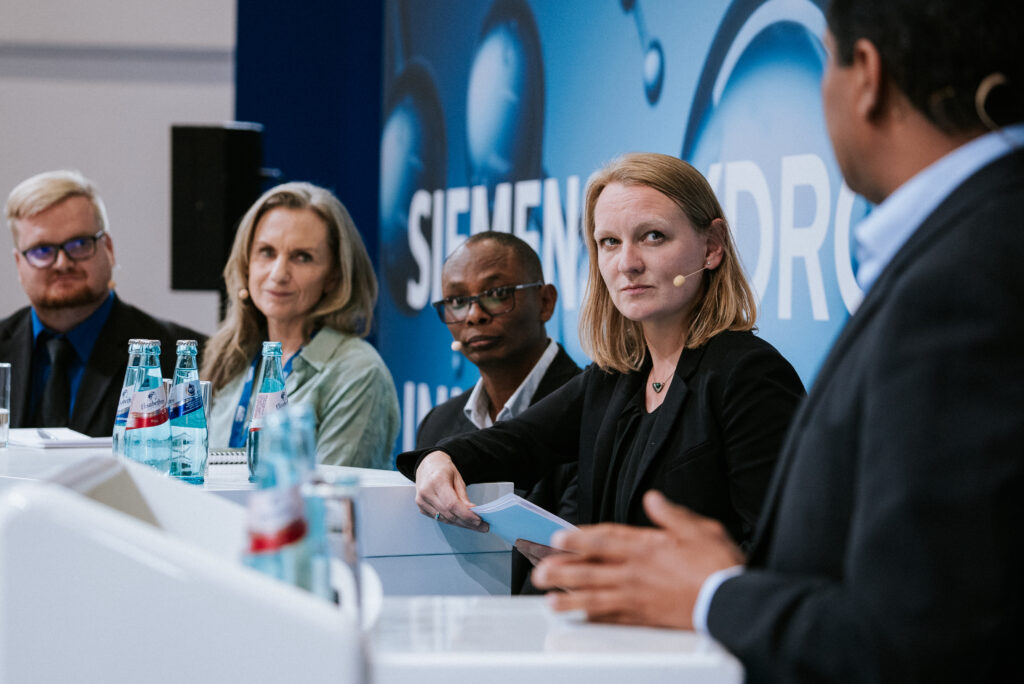
PtX Hub panel on the Siemens Hydrogen Innovation Stage. © Daniel Mayorov, ExpoMedia -
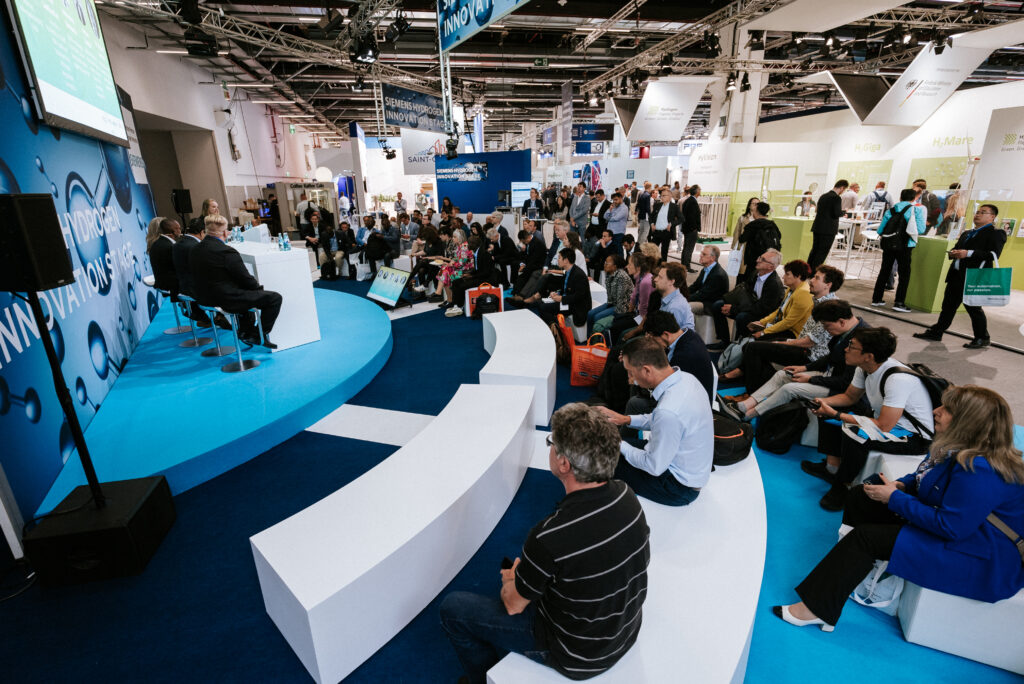
Audience during the panel. © Daniel Mayorov, ExpoMedia
The International PtX Hub’s sessions at ACHEMA 2024 highlighted the transformative potential of green hydrogen and PtX technologies in fostering PtX economies around the globe. Through insightful presentations and dynamic discussions, these sessions underscored the importance of international cooperation, regulatory support, and continuous innovation. The diverse application cases from Argentina, Kenya, Morocco, and South Africa demonstrated both the opportunities and challenges in advancing PtX solutions and reaching defossilisation goals.
Check our blogpost on the study tour in frankfurt.
